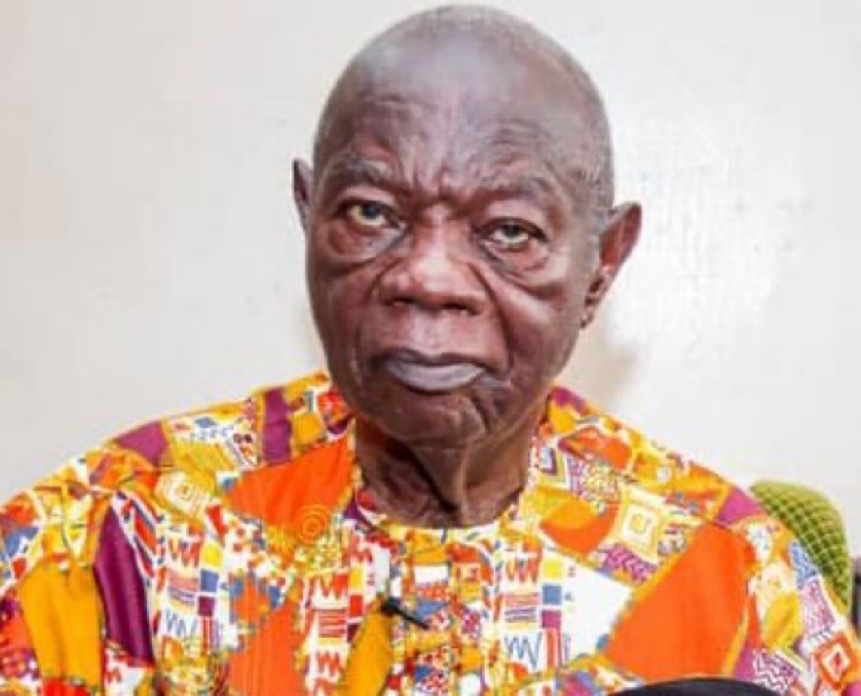Gentleman Mike Ejeagha, the revered Nigerian highlife musician and folklorist behind the iconic song “Gwo Gwo Gwo Ngwo,” passed away on Friday, June 6, 2025, at the 32 Garrison Hospital in Enugu, Nigeria. He was 95. His death, confirmed by his eldest son, Emma Ejeagha, followed a prolonged battle with prostate cancer, marking the end of a remarkable career that spanned over six decades and left an indelible mark on Nigerian music and culture.
Born in April 1930 in Imezi-Owa, Ezeagu Local Government Area of Enugu State, Ejeagha’s journey in music began in the 1950s when he started performing at local events in Enugu. His unique style blended highlife with Igbo folklore, earning him the nickname “Gentleman Mike” for his gentle demeanor and storytelling prowess. Ejeagha’s music was not just entertainment but a vessel for preserving Igbo culture, weaving proverbs, moral lessons, and historical narratives into his songs.
Ejeagha’s discography includes over 300 recordings, many of which are preserved in the National Archives of Nigeria. His 1983 album, Akuko N’egwu Vol. 1, featuring “Gwo Gwo Gwo Ngwo,” became a cultural phenomenon, particularly after comedian Brain Jotter used the track in a 2024 viral dance challenge. The song, which tells the folktale of a tortoise outsmarting an elephant, resonated globally, introducing Ejeagha’s work to a new generation and cementing his legacy.
His other notable works, such as “Omekagu,” “Uwa Mgbede Ka Mma,” and “Ka Esi Le Onye Isi Oche,” showcased his ability to craft melodies that were both musically captivating and rich in cultural significance. Ejeagha’s performances often featured his band, the Premier Dance Band, later renamed the Merry-Go-Round Dance Band, which accompanied him in live shows across Nigeria. His storytelling style, known as akuko n’egwu (storytelling through music), made him a beloved figure in Igbo communities and beyond.
In 2024, the resurgence of “Gwo Gwo Gwo Ngwo” through Brain Jotter’s dance challenge brought Ejeagha renewed fame at 94. The challenge, which garnered millions of views on platforms like TikTok and Instagram, saw participation from celebrities and fans worldwide, highlighting the timeless appeal of his music. Brain Jotter later visited Ejeagha in Enugu, donating N2 million to support the ailing musician, a gesture that sparked widespread appreciation.
Tributes have poured in from prominent figures, reflecting Ejeagha’s profound influence. Enugu State Governor Peter Mbah described him as a “cultural ambassador whose music transcended generations,” while highlife artist Flavour N’abania praised his ability to “teach morals and preserve Igbo heritage through song.” The Coalition of South East Youth Leaders also mourned him as a “custodian of our culture,” emphasizing his role in documenting Igbo traditions.
Ejeagha’s personal life was as rich as his musical career. He was a devoted family man, survived by his children and grandchildren, and was known for his humility and dedication to his craft. His home in Enugu remained a hub for visitors seeking to learn about his life and contributions to Nigerian music.
The highlife genre, which Ejeagha helped shape, thrived in Nigeria’s post-independence era, blending West African rhythms with jazz and calypso influences. His contemporaries, like Osita Osadebe and Victor Uwaifo, also elevated highlife, but Ejeagha’s focus on folklore set him apart. His songs often served as oral history, passing down lessons and cultural values to listeners.
Despite his age and health challenges, Ejeagha remained active in his community until his final days, occasionally sharing stories and songs with visitors. His death has left a void in the Nigerian music scene, but his extensive body of work ensures his legacy endures. Fans and scholars alike continue to study his recordings, which remain a treasure trove of Igbo cultural heritage.
Ejeagha’s impact extended beyond music into the broader cultural landscape. His ability to merge entertainment with education made him a revered figure in academic circles, with ethnomusicologists citing his work as a primary source for understanding Igbo oral traditions. His songs are still played at cultural events, weddings, and festivals across Nigeria.
The global reach of “Gwo Gwo Gwo Ngwo” in 2024 underscored the universal appeal of Ejeagha’s music. From Nigeria to the diaspora, fans recreated the dance challenge, with videos showing participants in the United States, Europe and Asia. This resurgence highlighted the power of social media in reviving classic works and introduced Ejeagha’s storytelling to younger audiences unfamiliar with highlife.
As Nigeria mourns the loss of this cultural icon, plans for tributes and memorials are underway. The Enugu State government has hinted at honoring Ejeagha with a state funeral, though details are yet to be finalized. His family has requested privacy during this period but expressed gratitude for the outpouring of love and support from fans.
Mike Ejeagha’s life and work embody the essence of highlife music as a vehicle for cultural preservation and storytelling. His songs, filled with wisdom and humor, will continue to resonate with audiences for generations. As the world bids farewell to Gentleman Mike, his voice remains immortalized in the melodies that defined an era and inspired a global movement.




